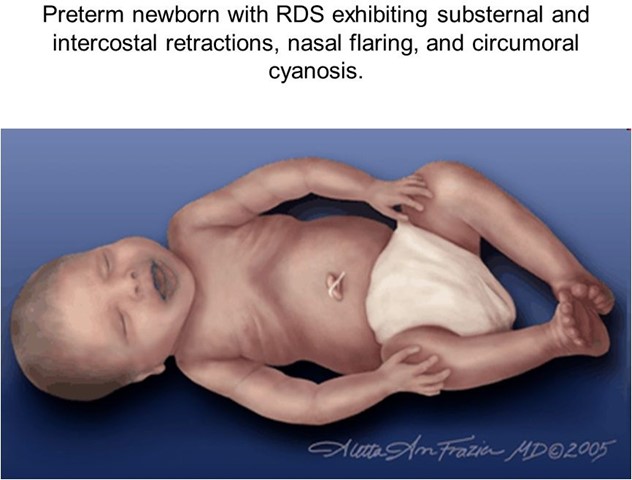The practical nurse (PN) receives shift report for four newborns in the full-term newborn nursery. Which infant should the PN assess first?
The ten-hour-old with circumoral cyanosis.
The one-day-old with a positive Babinski's reflex.
The two-day old with negative Ortolani's sign.
The six-hour-old with a large sacral "stork bite".
The Correct Answer is A
Circumoral cyanosis is a bluish discoloration around the mouth that indicates inadequate oxygenation. It is an abnormal finding in a full-term newborn and requires immediate assessment and intervention by the PN.

The other options are not correct because:
B. A positive Babinski's reflex is a normal finding in newborns that indicates intact neurological function. It is elicited by stroking the sole of the foot and observing the fanning of the toes.
C. A negative Ortolani's sign is a normal finding in newborns that indicates no hip dislocation or dysplasia. It is elicited by abducting the hips and feeling for any clicking or clunking sensation.
D. A large sacral "stork bite" is a common benign birthmark that appears as a reddish patch on the lower back or nape of the neck. It usually fades within the first year of life and does not require any treatment.
Nursing Test Bank
Naxlex Comprehensive Predictor Exams
Related Questions
Correct Answer is D
Explanation
The correct answer is choiceD. Contact information for a women’s shelter.
Choice A rationale:
While providing a safety plan is important, it may not be the most immediate or practical resource for a client in an abusive situation. A safety plan is a detailed strategy for leaving an abusive relationship safely, but it requires time and preparation, which may not be feasible in an urgent situation.
Choice B rationale:
Paperwork for a restraining order is a legal step that can help protect the client, but it may not provide immediate safety. The process of obtaining a restraining order can take time, and the client may need immediate shelter and support.
Choice C rationale:
Documenting the report of abuse in the visit summary is important for medical and legal records, but it does not directly provide the client with immediate resources or safety. This documentation can be useful for future legal actions but does not address the client’s immediate need for safety and support.
Choice D rationale:
Providing contact information for a women’s shelter is the most appropriate response because it offers immediate safety and support. Women’s shelters provide a safe haven, counseling, legal support, and other resources necessary for individuals experiencing domestic violence.This option prioritizes the client’s immediate safety and well-being.
Correct Answer is C
Explanation
The correct answer is choice C. Assign the remainder of medication administration to another PN who is performing treatments.
Choice A rationale:
Asking unlicensed assistive personnel (UAP) to give medications to their assigned residents is not the best action to take in this situation. Medication administration requires a certain level of training and knowledge to ensure safe and accurate delivery. UAPs may not have the appropriate training and legal authorization to administer medications, which could lead to potential errors and harm to the residents.
Choice B rationale:
Documenting why all the medications were not given to each resident is not sufficient to address the issue at hand. While documentation is essential for record-keeping and communication, it does not resolve the problem of medication administration being left incomplete. The priority should be finding a qualified person to administer the remaining medications.
Choice C rationale:
This is the correct answer because assigning the remainder of medication administration to another PN who is performing treatments ensures that qualified and trained personnel are handling the medication administration. This PN is likely familiar with medication protocols and safety measures, reducing the risk of errors.
Choice D rationale:
Denying the medication aide's request to leave before all medications are given might not be practical if the aide is genuinely unwell or unable to continue working safely. The focus should be on ensuring that medication administration is completed by qualified staff rather than forcing the sick aide to stay.
Whether you are a student looking to ace your exams or a practicing nurse seeking to enhance your expertise , our nursing education contents will empower you with the confidence and competence to make a difference in the lives of patients and become a respected leader in the healthcare field.
Visit Naxlex, invest in your future and unlock endless possibilities with our unparalleled nursing education contents today
Report Wrong Answer on the Current Question
Do you disagree with the answer? If yes, what is your expected answer? Explain.
Kindly be descriptive with the issue you are facing.
